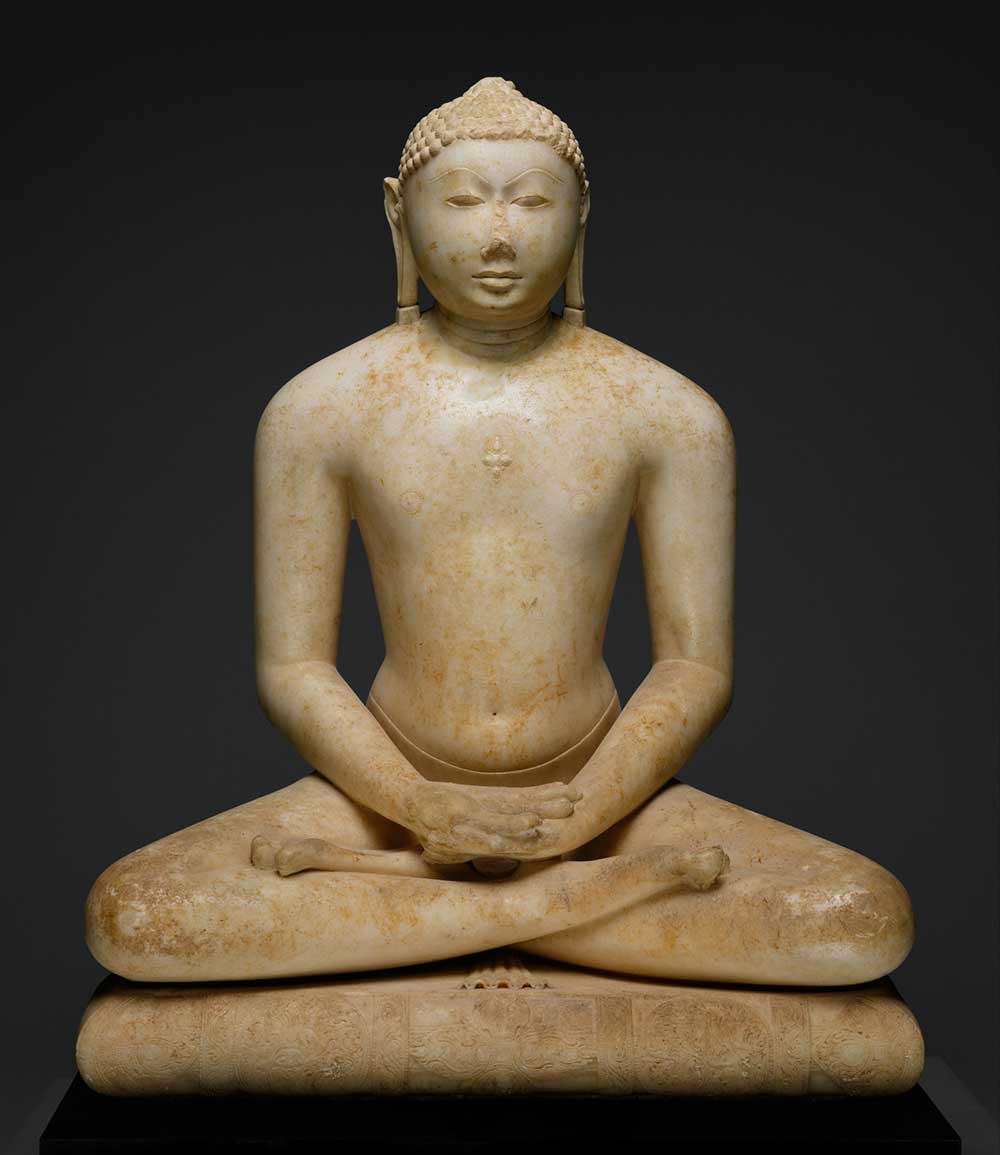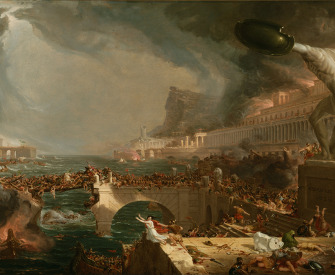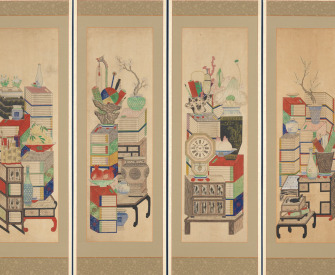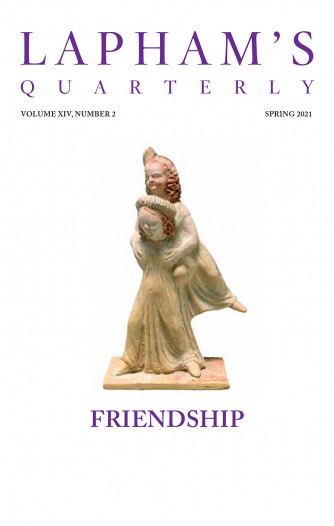If men are to wait for liberty till they become wise and good in slavery, they may indeed wait forever.
—Thomas Babington Macaulay, 1843Andrey Kurkov Picks Up His Pen
On the freedom to write in Ukraine.
When I think about the current situation in Ukraine and about what I must say today, I get the impression that I should be giving not the Arthur Miller Lecture but the George Orwell Lecture. Russian aggression has stretched its steel grip out to us as if from the distant Soviet past, from the twentieth century, from a country in which there is a Ministry of Truth and a Ministry of Happiness, from a country where the massacre of civilians and the destruction of cities is accompanied by the music of Shostakovich and Tchaikovsky, from a country where even monuments to Pushkin are dressed in military uniforms and forced to take part in the fight against Ukraine and against Ukrainian identity and culture.
On the first of May, I sat in my car at the Ukrainian-Slovak border for five hours in order to leave war-torn Ukraine in order to get to Denmark and from Denmark to get here, to New York, for this meeting. The distance you have to cover does not become longer when the flat racecourse is converted into a steeplechase course. The distance is simply filled with new meaning and it requires new strength and new understanding from those who want to overcome this distance. The same thing happens with any tasks: war changes the rules for solving them but does not make the desired result impossible.
Today the task for Ukraine is to defend its independence, defend its freedom, and complete the reforms that should have been fully implemented long ago. To forge any change, you need to know the truth of the situation. For any decision-making, in war or in peacetime, without an understanding of the true state of affairs it is impossible to achieve a result. You cannot even choose the right route to the goal.
I have always tried to avoid pathos, and if I cannot avoid it now, please forgive me. Pretentious words like truth, justice, and motherland used to set my teeth on edge. I could not but doubt the sincerity of the speaker if, of course, I were not utterly convinced of their insincerity. Now I catch myself thinking pretentious thoughts. I try to muffle them. I try to think about what is happening calmly and coolly. But, to be honest, I don’t always succeed.
When the new, bloodier phase of Russian aggression began on February 24 of this year, when the shock of the first days of the new war had passed, I found myself wanting to look back and say thank you to everyone who had been with me in my pre–February 24 life and who had helped me make my life interesting, useful, fulfilling, and meaningful. The first name that came to my mind was the name of my country, my Ukraine.
Ukraine is a country of individualists. Every Ukrainian has his own personal Ukraine. Every Ukrainian appreciates something special about his homeland, something that is important for her or him. It might be the country’s amazing and diverse nature, it might be the fertile black soil that produces 10 percent of the world’s wheat. For me, Ukraine is, first of all, the space of my personal freedom. This is a country that since 1991 has given me more than thirty years of life and work without censorship, without political control, without pressure. Even today, during the Russian aggression, during attacks that every day take the lives of Ukrainian citizens—military and civilian—the government of Ukraine has not introduced real military censorship and has not told citizens what to say or what to think. Yes, of course, information about what is happening on the fronts of the war is not freely dispersed. We have had to learn new rules of behavior regarding information. But even in wartime, the Ukrainian state has remained essentially democratic, trying not to restrict the freedoms of citizens, including the freedom of speech.
When you live in a free country and are a free citizen, freedom seems to be something natural, something that no one can take away from you. But even with the freedoms guaranteed by the constitution of Ukraine, in our country there has always been a struggle between those who wanted to tell the truth and those who wanted to make it inaccessible. It was not politicians who took part in this struggle but journalists. The number of casualties among representatives of honest journalism testify to the cruelty of this struggle. Over the years of independence, about one hundred journalists have died in Ukraine; in the past two months, more than twenty of them have been killed by the Russian military. Journalism remains one of the most dangerous professions, and during war it becomes even more dangerous. The inscription press on a bulletproof vest or helmet is to the Russian military like a red rag to a bull.
The level of journalism traditionally shows the level of democracy in society. We can see how independent journalism is being destroyed by the example of annexed Crimea. Immediately after the annexation, some journalists remained working there, including freelancers for Radio Liberty. One by one, they were deported from the peninsula or arrested. Citizen journalists stepped in to replace them—courageous people who understood the necessity of objective information about what was happening. Today there are fourteen Ukrainian citizen journalists in prisons in Crimea and Russia, against whom criminal cases have been fabricated. They are accused of terrorism or religious extremism, although their only fault is that they voluntarily assumed the responsibility to cover the repression of the Russian authorities against dissidents, against those who do not recognize the annexation of Crimea, against those who do not agree with Putin’s policies. I want to remember by name these courageous people who have already been sentenced to long prison terms or are awaiting their sentence. They are Vladislav Esipenko, Marlen Asanov, Osman Arifmemetov, Remzi Bekirov, Ruslan Suleimanov, Rustem Sheykhaliev, Server Mustafayev, Seyran Saliev, Timur Ibragimov, Amet Suleymanov, Alexei Bessarabov, Irina Danilovich, and former journalist, politician, and deputy chairman of the Crimean Mejlis Nariman Dzhelal. In addition to them, more than two hundred Ukrainian citizens are in Russian prisons and in the prisons of the annexed Crimea on fictitious charges.
For a writer and for a journalist, there is no more important freedom than the freedom to write. And if a journalist or writer continues to write, realizing that he can be repressed for this, this only speaks of the courage and dedication of such a person.

Jain Svetambara Tirthankara in meditation, India, early eleventh century. The Metropolitan Museum of Art, purchase, Florence and Herbert Irving gift, 1992.
My family’s world changed on February 24. The whole world changed on February 24, when the aging and ailing President Putin gave the order to launch a crusade against Ukraine, against the collective West, against democracy, and against Western civilization.
Putin left Ukraine no choice but to fight for its independence to the end—to the bitter end. He left no choice to the civilized world. The world should help Ukraine, and the world does help Ukraine defend its freedom—defend all the freedoms of its citizens.
Now, as I speak to you, the Russian occupation forces in the Kherson region in southern Ukraine, near the Black Sea, are trying to switch the Ukrainian internet to a Russian service and are warning residents in the occupied territories that soon they will not have access to Facebook or Instagram. In this way the invaders warn Ukrainians that they are about to become “Russians” and that they must accept this as something that cannot be changed. They must give up their freedoms and rights, as tens of millions of Russians have done. I know how the people who remained under occupation feel; I know what they are thinking now, and my thoughts are with them. Several times I have spoken via messengers with colleagues who found themselves in the occupied zone. I have lost touch with some of them. But I know that they will not accept the rules of slavery that Russia is trying to impose on Ukrainians who find themselves in the territories occupied by the Russian army.
Ukrainian writers, regardless of the language they write in, will never give up the freedom to write what they think and what they consider important.
Ukrainians, writers or not writers, cannot and will not learn to live without freedom.
From the Arthur Miller Freedom to Write Lecture, May 13, 2022, PEN America World Voices Festival, New York, NY. Copyright © 2022 by Andrey Kurkov. Used with permission of PEN America.

Andrey Kurkov
From a speech delivered at the PEN World Voices Festival. The son of a doctor and a pilot, Kurkov trained as a Japanese translator and began writing novels while serving as a prison guard in Odesa. His novel Grey Bees, which he wrote after meeting refugees in Kyiv who made regular trips to the Donbas to deliver medicine, depicts the 2014 war through the perspective of a beekeeper. “For Ukrainians, freedom is more important than stability,” Kurkov said in a March 2022 interview. “For Russians, it is the opposite. Ukrainians change their presidents at each election, Russians keep their tsar until the tsar is dead.”


